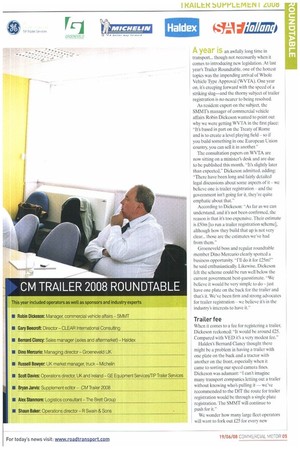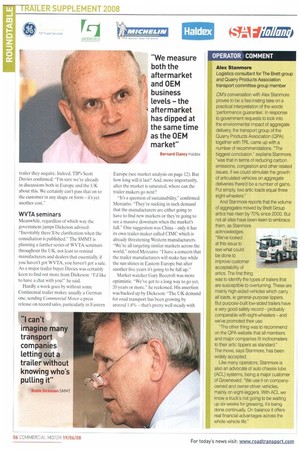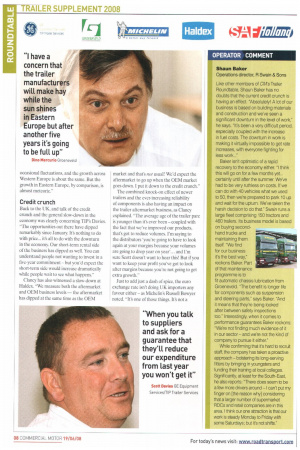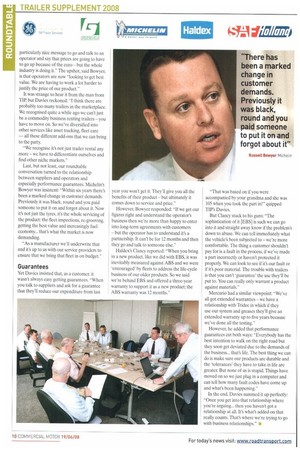A year is an awfully long time in transport... though
Page 63

Page 64

Page 66

Page 68

If you've noticed an error in this article please click here to report it so we can fix it.
not necessarily when it comes to introducing new legislation. At last year's Trailer Roundtable, one of the hottest topics was the impending arrival of Whole Vehicle Type Approval (WVTA). One year on, it's creeping forward with the speed of a striking slug—and the thorny subject of trailer registration is no nearer to being resolved.
As resident expert on the subject, the SMMT's manager of commercial vehicle affairs Robin Dickeson wanted to point out why we were getting WVTA in the first place: "It's based in part on the Treaty of Rome and is to create a level playing field so if you build something in one European Union country, you can sell it in another."
The consultation papers on WVTA are now sitting on a minister's desk and are due lobe published this month. "It's slightly later than expected," Dickeson admitted. adding: "There have been long and fairly detailed legal discussions about some aspects of it we believe one is trailer registration and the government isn't going for it, they're quite emphatic about that."
According to Dickeson: "As far as we can understand, and it's not been confirmed, the reason is that it's too expensive. Their estimate is f5Oni [to run a trailer registration scheme], although how they build that up is not very clear.., those are the estimates we've had from them."
Groeneveld boss and regular roundtable member Dino Mercurio clearly spotted a business opportunity "I'll do it for £25m!" he said enthusiastically. Likewise, Dickcson felt the scheme could be run well below the current government best-guesstimate. "We believe it would be very simple to do just have one plate on the back for the trailer and that's it. We've been firm and strong advocates for trailer registration we believe it's in the industry's interests to have it."
Trailer fee
When it comes to a fee for registering a trailer, Dickeson reckoned: "It would be around £25. Compared with VED it's a very modest fee."
Haldex's Bernard Clancy thought there might be a problem in having a trailer with one plate on the back and a tractor with another on the front, especially when it came to sorting our speed camera fines. Dickeson was adamant: "I can't imagine many transport companies letting out a trailer without knowing who's pulling it — we've recommended to the DIT the route for trailer registration would be through a single plate registration. The SMMT will continue to push for it."
We wonder how many large fleet operators will want to fork out £25 for every new trailer they acquire. Indeed, TIP's Scott Davies confirmed: "I'm sure we're already in discussions both in Europe and the UK about this. We certainly can't pass that on to the customer in any shape or form it's yet another cost."
WVTA seminars
Meanwhile, regardless of which way the government jumps Dickeson advised: "Inevitably there'll be clarification when the consultation is published." The SMMT is planning a further series of WVTA seminars throughout the UK, not least to remind manufacturers and dealers that essentially, if you haven't got WVTA, you haven't got a sale. As a major trailer buyer Davies was certainly keen to find out more from Dickeson: "I'd like to have a chat with you!" he said.
Hardly a week goes by without some Continental trailer maker, usually a German one, sending Commercial Motor a press release on record sales, particularly in Eastern Europe (see market analysis on page 12). But how long will it last? And, more importantly, after the market is saturated, where can the trailer makers go next?
"It's a question of sustainability." confirmed Mercurio. "They're sucking in such demand that the manufacturers are either going to have to find new markets or they're going to see a massive downturn when the market's full." One suggestion was China only it has its own trailer-maker called CIMC which is already threatening Western manufacturers. "We're all targeting similar markets across the world," noted Mercurio. -I have a concern that the trailer manufacturers will make hay while the sun shines in Eastern Europe but after another five years it's going to be full up."
Market watcher Gary Beccroft was more optimistic. "We've got to a long way to go yet. 20 years or more." he reckoned. His assertion was backed up by Dickeson: -The UK demand for road transport has been growing by around 1.8% that's pretty well steady with occasional fluctuations, and the growth across Western Europe is about the same. But the growth in Eastern Europe, by comparison, is almost meteoric."
Credit crunch
Back to the UK, and talk of the credit crunch and the general slow-down in the economy was clearly concerning TIP's Davies. "The opportunities out there have dipped remarkably since January. It's nothing to do with price... it's all to do with the downturn in the economy. Our short-term rental side of the business has dipped as well. You can understand people not wanting to invest in a five-year commitment but you'd expect the short-term side would increase dramatically while people wait to see what happens."
Clancy has also witnessed a slow-down at Haldex. -We measure both the aftermarket and OEM business levels — the aftermarket has dipped at the same time as the OEM market and that's not usual! We'd expect the aftermarket to go up when the OEM market goes down. I put it down to the credit crunch."
The combined knock-on effect of newer trailers and the ever-increasing reliability of components is also having an impact on the trailer aftermarket business, as Clancy explained. "The average age of the trailer parc is younger than it's ever been coupled with the fact that we've improved our products, that's got to reduce volumes. I'm saying to the distributors 'you're going to have to look again at your margins because your volumes are going to drop year on year'... and I'm sure Scott doesn't want to hear this! But if you want to keep your profit you've got to look after margins because you're not going to get extra growth."
Just to add just a dash of spice, the euro exchange rate isn't doing UK importers any favour either as Michelin's Russell Bowyer noted. "It's one of those things. It's not a particularly nice message to go and talk to an operator and say that prices are going to have to go up because of the euro but the whole industry is doing it." The upshot, said Bowyer, is that operators are now "looking to get best value. We are having to work a lot harder to justify the price of our product."
It was strange to hear it from the man from TIP, but Davies reckoned: "I think there are probably too many trailers in the marketplace. We recognised quite a while ago we can't just be a commodity business renting trailers you have to move on. So we've diversified into other services like asset tracking, fleet care — all these different add-ons that we can bring to the party.
"We recognise it's not just trailer rental any more we have to differentiate ourselves and find other niche markets."
Last, but not least, our roundtable conversation turned to the relationship between suppliers and operators and especially performance guarantees. Michelin's Bowyer was insistent: "Within six years there's been a marked change in customer demands. Previously it was black, round and you paid someone to put it on and forgot about it. Now it's not just the tyres. it's the whole servicing of the product: the fleet inspections, re-grooving, getting the best value and increasingly fuel economy.., that's what the market is now demanding.
"As a manufacturer we'll underwrite that and it's up to us with our service providers to ensure that we bring that fleet in on budget."
Guarantees
Yet Davies insisted that, as a customer, it wasn't always easy getting guarantees. "When you talk to suppliers and ask for a guarantee that they'll reduce our expenditure from last year you won't get it. They'll give you all the benefits of their product but ultimately it comes down to service and price."
However, Bowyer responded: "If we get our figures right and understand the operator's business then we're more than happy to enter into long-term agreements with customers but the operator has to understand it's a partnership. It can't be for 12 months and then they go and talk to someone else."
Haldex's Clancy reported: "When you bring in a new product, like we did with EBS, it was inevitably measured against ABS and we were 'encouraged' by fleets to address the life-cycle business of our older products. So we said we're behind EBS and offered a three-year warranty to support it as a new product; the ABS warranty was 12 months." "That was based on if you were accompanied by your grandma and she was 105 when you took the part in!" quipped TIP's Davies.
But Clancy stuck to his guns: "The sophistication of it [EBS] is such we can go into it and straight away know if the problem's down to abuse. We can tell immediately what the vehicle's been subjected to we're more comfortable. The thing a customer shouldn't pay for is a fault in the process, if we've made a part incorrectly or haven't protected it properly. We can look to see if it's our fault or if it's poor material. The trouble with trailers is that you can't 'guarantee' the use they'll be put to. You can really only warrant a product against materials."
Mercurio had a similar viewpoint: "We've all got extended warranties we have a relationship with Tridec in which if they use our system and greases they'll give an extended warranty up to five years because we've done all the testing."
However, he added that performance guarantees cut both ways: "Everybody has the best intention to walk on the right road but they soon get deviated due to the demands of the business.., that's life. The best thing we can do is make sure our products are durable and the 'tolerances' they have to take in life are greater. But none of us is stupid. Things have moved on so we just plug in a computer and can tell how many fault codes have come up and what's been happening."
In the end, Davies summed it up perfectly: "Once you get into that relationship where you're arguing... then you haven't got a relationship at all. It's what's added on that really counts. That's where we're trying to go with business relationships."
















































































































































































































